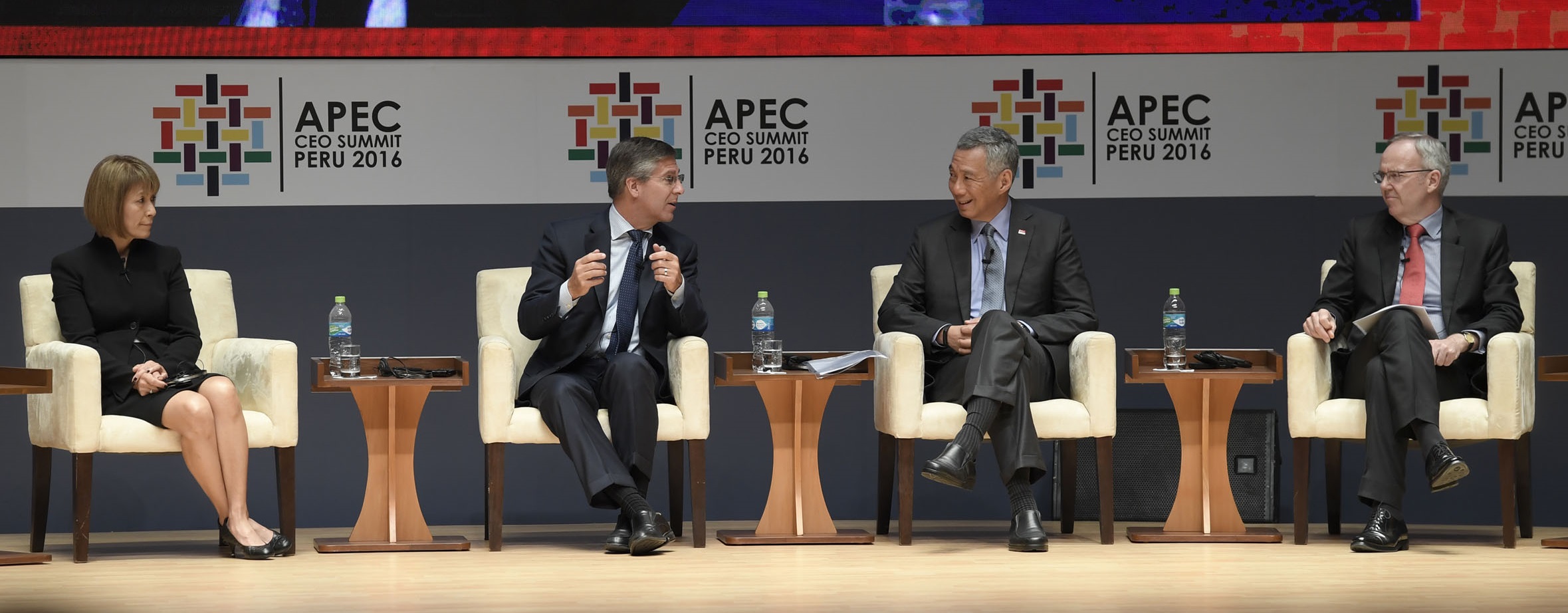PM Lee Hsien Loong at the APEC CEO Summit Forum Discussion on the "The DNA of Global Growth"
SM Lee Hsien Loong
Economy
Foreign affairs
Trade
18 November 2016
Speech followed by dialogue session with PM Lee Hsien Loong at the APEC CEO Summit Forum Discussion on the "The DNA of Global Growth" on 18 November 2016. PM Lee was at the 2016 APEC CEO Summit in Lima, Peru.
This article has been migrated from an earlier version of the site and may display formatting inconsistencies.

Q: It is not fashionable these days to promote trade liberalisation. Many voters in the West do not feel like they are benefiting from free trade. How big a danger is it if Trump implements anti-trade policy or if the US pulls back from free trade?
PM Lee Hsien Loong: We will find ways to live with it but it will be a big minus. America is the biggest market in the world, it is the most open. The Europeans will dispute this, but I think it is really the most open market in the world. It is the engine pushing for freer trade for many years. In fact – less so in recent years because of domestic politics – but in the sixties, seventies, even in the eighties and nineties, without America, you would not have made any progress, first on the GATT and then the WTO. Even now, without access to the US economy and US markets – we can promote growth in Europe, as there are problems there which deserve solving. We can promote growth in Asia, as there are also opportunities there which need to be exploited. But you are missing out on a huge opportunity if America is not part of the story. And it is not only missing out on the positive, but risking a very big negative in terms of destabilising the global trading and strategic system.
Q: PM Lee, what does Singapore do to stay in the game? You are a model for being a business-friendly regulatory environment, so how do you stay on point?
PM Lee: I will make two complementary, almost contradictory points. One, you must have stability. When somebody makes an investment, he is committing to you for twenty, thirty, forty years, he comes in on certain expectations, you must make it quite clear right at the start what those expectations should be, and you have to honour your word, over many terms of government. You must have stability, and predictability in your regulations.
But on the other side, when you are talking about the new economy and disruption, and totally new activities, whether it is Airbnb or whether it is Uber, Lyft and Rideshare, you also must know where old regulations are no longer relevant and have to change, and what the new framework is, which the new activities are. To believe that old rules can apply without any change to a new world is unrealistic, but to believe, like some of the new acolytes proclaim, that regulations are now totally unnecessary and we can just go forth and do a free for all, and everybody will thrive and be happy, I do not think that is correct either. So you need to know how to drop the old rules and what the new ones are which you must put in place.
It is also the same with financial services, fintech. We are looking for ways that you can have a sandbox, where you have a restricted environment, within which people can try new things and I can try new rules and depending on what works, then I open up the sandbox and it becomes the new rule for the whole system. But you need good regulators, responsive but not captured.
Q: What is PM Lee's opinion of the future of China’s belt and road initiatives?
PM Lee: Well, we are happy that China is pursuing the belt and road initiatives. It is a natural thing for them to do. Their economy is growing, their links to the world are also growing, and they naturally want to develop trade routes, the investment connections, the economic integration with their neighbours, whether it is Central Asia, whether it is Southeast Asia, whether it is across the Pacific with America. And we encourage that. We think it is the right way for China to engage with the world. The AIIB is a positive initiative. Singapore is one of the first countries to join the AIIB or state our intention to join. And we think that it will be win-win. But of course nowadays, however strong an economy is, not all roads will lead only there. There will be other links between the countries in Asia, between the countries in Asia with America, with Europe, and China will fit into this global network. I think it is important that we understand that in this new world, there is no country which is the middle kingdom.
Q: How should we better educate people of the benefits of globalisation?
PM Lee: I would say it is not just a matter of education. It is also a matter of making sure the reality reflects the rhetoric. And if you are in the Rust Belt, you will see the world as having got worse. And in states like Ohio, it has got worse, but you have to make sure it gets better. And that is not easy to do. You have got to put investments in, put programmes in, and it cannot be boondoggled. They have really to work. And then young people can feel that there is a future and this is the way forward. Otherwise, if we tell them, “it is all for the best and you are just part of the necessary sorrow in this best of possible worlds”, I do not think you are going to win very many votes.
Explore related topics
